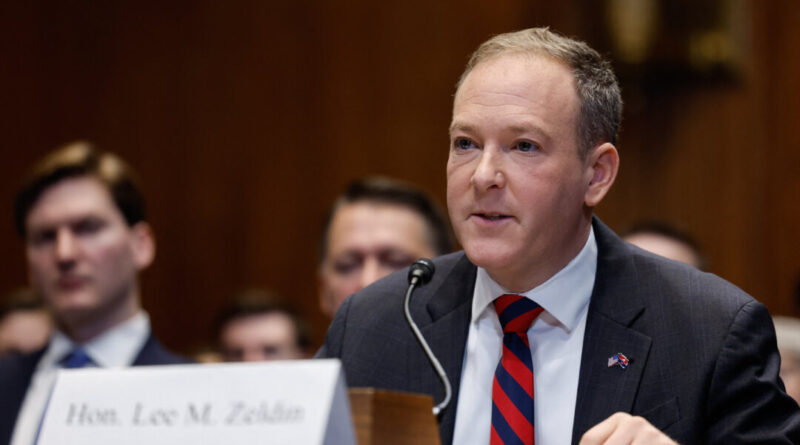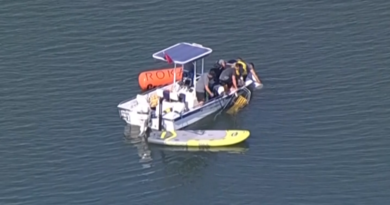5 Key Insights from Lee Zeldin’s EPA Confirmation Hearing
Zeldin acknowledged that climate change is an undeniable reality, discussing issues such as armed EPA agents, plastic pollution, and the importance of striking a balance between environmental protection and economic growth.
WASHINGTON—Lee Zeldin, selected by President-elect Donald Trump to head the Environmental Protection Agency, appeared before senators on the Committee on Environment and Public Works on Thursday.
Although lawmakers addressed financial controversies involving the former New York congressman, the initial questioning on Jan. 16 was largely amicable. Senators from both parties highlighted that Zeldin had met with them prior to the hearing.
The 2022 New York gubernatorial candidate responded to questions about climate change, plastic pollution, armed EPA agents, and more. Here are some key takeaways.
1. Bipartisanship and Balance
During his opening statement, the former congressman emphasized the necessity of pursuing environmental aims while safeguarding American prosperity.
“We must leverage the greatness of American innovation alongside the excellence of American conservation and environmental stewardship. It is essential that we protect the environment without jeopardizing our economy,” he stated.
Zeldin also stressed the importance of bipartisan collaboration. His message resonated with that of Sen. John Barrasso (R-Wyo.), who introduced him and quoted President John F. Kennedy, Jr., a Democrat.
“The American people require leaders capable of finding common ground to address the urgent challenges we face,” Zeldin remarked, referencing his cross-party efforts to preserve the Long Island Sound during his time in the House.
Zeldin also highlighted his involvement with the bipartisan Climate Solutions Caucus.
2. Armed EPA Agents
One discussion with Sen. Dan Sullivan (R-Alaska) revolved around the EPA’s law enforcement practices in Sullivan’s state—actions that Sullivan argued were inconsistent with the spirit of cooperative federalism.
During the Obama administration, the EPA faced backlash for a 2013 raid on a gold mine in Chicken, Alaska, carried out by armed agents. These agents, who were investigating potential violations of the Clean Water Act, found none and were perceived as intimidating by miners. Sullivan also raised concerns about recent enforcement measures concerning auto repair shops in the area.
“My state supports the Second Amendment; most residents are armed. This poses a serious risk because some agents might get shot upon their arrival,” Sullivan commented, suggesting that the EPA should have pursued more collaborative approaches before intervening.
“Do you believe the EPA should even have armed agents?” he probed, proposing that local law enforcement could handle such matters.
“It’s outrageous,” Zeldin remarked in response to the Alaska raid.
He advocated for enhanced cooperation while not entirely dismissing the concept of armed agents.
“If an enforcement action on a prosecutorial level involves collaboration with the Department of Justice, there are existing laws enacted by Congress that include enforcement as part of compliance efforts,” he explained.
“Some property owners need to undertake mitigation measures and are eager to collaborate with the government to achieve those goals. We should facilitate that process,” he concluded.
3. Fossil Fuel Views
Sen. Ed Markey (D-Mass.) pressed the EPA nominee about his stance on fossil fuels.
Markey referenced a 2016 statement from Zeldin, made during a debate against Anna Throne-Holst, the Democratic candidate for his seat, where Zeldin emphasized that reducing reliance on fossil fuels was vital for improved environmental management.
“Do you still maintain, Mr. Zeldin, that it’s our responsibility to lessen our dependence on fossil fuels?” Markey inquired.
Zeldin began to assert his support for an all-of-the-above energy strategy, but Markey interrupted to restate the question.
“Taking all factors into account, in a perfect scenario, we would continuously strive for the cleanest, greenest energy alternatives possible,” Zeldin replied.
Markey interpreted Zeldin’s response as indicating a shift in his energy policy approach.
“I’m not hearing you affirm Lee Zeldin’s position from 2016, suggesting we are discussing a different context during your nomination hearing,”
4. Microplastics and Plastic Pollution
The nominee also addressed plastic pollution. He highlighted the Save Our Seas Act of 2018, which targeted marine debris and saw collaboration between Whitehouse and Sullivan as a bipartisan achievement.
Sen. Jeff Merkley (D-Ore.) raised concerns regarding studies and news reports about the health risks associated with microplastics and nanoplastics, particularly their effects on human fertility.
Zeldin recognized that microplastics are certainly “a matter of significant interest and concern” for the senator.
“I would welcome the chance to review the specific materials you’re mentioning, as I want to be well-versed with any details you present that I may not have encountered before,” he stated.
Merkley challenged the chemical industry’s promotion of plastic recycling, indicating that its applications remained limited.
Zeldin acknowledged familiarity with the industry’s public relations efforts.
“I am examining and studying all viewpoints on this subject,” he said, before discussing his own initiatives on waterway cleanups while serving in the House.
5. Climate Change
“I stand firm in my belief that climate change is real, as I have stated before,” Zeldin told Sen. Bernie Sanders (I-Vt.).
Zeldin noted that Trump’s previous remarks labeling climate change as a “hoax” were critiques aimed at the policies implemented in response to the phenomenon.
“I respectfully disagree,” responded Sanders.
The senator pressed further, asking if Zeldin viewed climate change as an existential threat—implying an urgent need for action.
“We must urgently tackle these challenges,” Zeldin asserted, indicating he was ready to exert pressure on other nations regarding environmental policy.
In reply to earlier inquiries from Ranking Member Sheldon Whitehouse (D-R.I.), the nominee acknowledged a connection between carbon dioxide emissions and ocean acidification and recognized rising sea levels as a critical issue.
“That’s what the scientists have informed me,” Zeldin said when asked about the impact of greenhouse gas emissions on ocean warming.
He communicated to Whitehouse that large-scale carbon dioxide emissions “definitely need attention from the EPA,” pointing out that both carbon dioxide and methane emissions contribute to heat retention.
He articulated that the EPA has treated carbon dioxide as a pollutant, aligning with the 2007 Supreme Court ruling in Massachusetts v. EPA, while emphasizing that it was not classified among the six air pollutants listed in the Clean Air Act.



